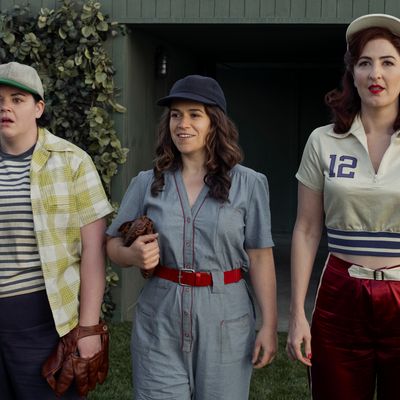
Batter up! Hear that call! The time has come for one and all … to play — well, you get it. You get it because I’m pretty sure that 85 percent of the viewing audience for this series arrived curious to see how it holds up next to the beloved 1992 Penny Marshall film of the same name. As someone who has watched the movie version of A League of Their Own more than a healthy number of times (randomly yelling, “I’ve been traded to Racine!” in everyday conversation gives you a real high, trust me), I’m very happy to report that the TV series — at least here in the first episode — very much keeps the overall vibe of the movie intact while also broadening and deepening the story of the beginnings of the All-American Girls Professional Baseball League. The film is a perfect mix of heartfelt and funny, full of moments both empowering and infuriating, and it always, always treats the characters’ athletic prowess with respect, even when people within the film did not — the series gets all of that right from the jump. And in a smart move, creators Abbi Jacobson and Will Graham, who are clearly fans, have given us a whole new cast of characters to tell their version of the story — there are similarities and callbacks without it feeling like a retread.
It’s 1943, and as World War II rages on, Major League Baseball is on the brink of shutting down, so MLB team owner and chocolate magnate Mr. Baker (in the movie it’s Mr. Harvey, in real life it was King of Gum, Philip K. Wrigley) decides to start a women’s baseball league in the Chicago area. He wants great ballplayers but also demands they’re “ladylike and feminine” because misogyny, baby. Women arrive from all across the country to try out, most of them have never seen so many other women who can play at their caliber. In the most moving scene of the pilot, three of our soon-to-be-Peaches, Carson Shaw, Greta Gill, and Jo De Luca, step out onto the field for the first time to find it full of other women warming up and they immediately have tears in their eyes. It’s a dream come to life.
Speaking of dreams come to life, specifically mine: Within the first ten minutes of this show, we get our very first sports montage. Listen, I have not one single athletic bone in my body, but goddamn it, do I live for a sports montage. This one is fun and invigorating and makes my heart think I can do things my decrepit body sees and is like, Oh, no way in hell, lady. And this montage of tryouts is especially empowering because these women are insanely good at what they do. Sure, some of them might be complete messes in their personal lives, but they can play baseball.
Yes, obviously I’m talking about one Mrs. Carson Shaw. When we first meet Peaches catcher Carson Shaw, she is chasing after a train in her small Idaho town about to miss her only chance to play pro ball. Her bra is out, she freaks out an old lady with a fairly unhinged discussion on Pride and Prejudice, and she is jittery and awkward. She’s kind of a disaster, but she’s also a great baseball player. And that might be the only thing she really knows about herself — or at least wants to admit knowing about herself. Honestly, even that is hard for her to own up to. Later, she confesses that her husband Charlie — who is on his way home from the war as we speak — has no idea she’s skipped town to play professionally. Carson is a ball of insecurities, which is probably why Greta can so easily get under her skin.
Greta, a tall, pretty redhead (some real Dottie Hinson vibes), is seemingly one of the most self-assured humans to walk this earth (surely there’s more to the story). She’s arrived with her childhood best friend Jo but instantly takes a liking to Carson. She immediately pushes Carson out of her comfort zone in increasingly consequential ways. First, a much-needed haircut. Then, she gets her drunk and “helps” her write a letter telling Charlie the truth about baseball and … possibly her real feelings about him, which I’m guessing might not be exactly wife kind of love, you know? And then, finally, when Greta leads the Peaches out to a bar on their first night in Rockford — she does not care for the rules laid out by team chaperone Sarge (a delightfully cast Dale Dickey) — she pushes her in another way.
Most of Carson and Greta’s interactions thus far have been friendly with a strong hint of sexual tension. Here at the bar, Greta lays the flirting on much thicker. And although nervous, Carson reciprocates. They both note how they’ve never met anyone like the other, and when Carson thinks about the letter she just mailed her husband, she admits to feeling like she’s messing up this life she’s built, a life she always thought she wanted — but she doesn’t want to stop doing it because “it feels good.” Greta takes her to a supply closet and kisses her. Carson kisses her back. But just as Carson seems really into it, Greta pulls away. “I thought so,” she says before she walks out. The last time Carson sees her that night, she’s running off with a military guy to “show him the sights.” The whole thing is bafflingly manipulative, and Carson is left standing there confused and hurt.
She’s not standing there alone, though — a woman named Maxine Chapman sees the whole thing go down but promises she won’t say anything. Carson recognizes her almost instantly: She was the Black woman who showed up to tryouts and was turned away — but not before showing everyone there that she could throw the ball farther than anyone else on that field. She’s like good good at baseball. She showed up with her best friend Clance — Gbemisola Ikumelo steals every scene she’s in, by the way — as support, knowing she most likely won’t even be allowed to participate but hoping that she’ll be given a shot based on her talent. Oh buddy, when that coach tells her to get off the field because they’re only considering “all-American girls,” did you not want to gauge his eyes out?
After the tryout debacle, Max, who has only ever dreamed of playing baseball, is defeated. While her father is super supportive of her talent, her mother owns her own hair salon (in Rockford, Illinois, conveniently!) and wants Max to take it over someday (“Owning your own business in this country is the only way you can have some control over your life,” Mrs. Chapman tells her daughter), and for the first time in her life, she is really considering it. Yes, at one point she did tell her mother that things like bookkeeping made her “want to light myself on fire,” but she’s tired of being disappointed. She’s tired of putting stock in a dream that seems impossible.
But it seems like those feelings of defeat will pass. You can’t keep a dreamer down for too long! She and Clance head to the bar where Clance’s (very new, very adorable) husband works so that Max can reem him out for telling her mom that she went to the tryouts, and that bar just so happens to be the same place where the Peaches are hanging out. Seeing her “competition” acting like idiots out there on the dance floor (Clance’s “What in the ‘Howdy Doody white Jesus unseasoned chicken’ kind of dancing is this?” about sums it up) certainly fans the flame of wanting to play — she knows she has the same, if not more, talent. What really pushes her over the edge, however, is learning that her friend Gary, a waiter at the bar who would very much like to be more than friends, tells her that he just got a job at the screw factory and is playing for their baseball team. Max doesn’t care that it’s a men’s team or that the screw factory doesn’t even hire Black women — she’s better than Gary and she wants a spot. It’s infuriating to watch as she’s turned away from every opportunity to play. For Max, however, she uses that frustration to fuel her: The next morning, we see her opening up the salon, sure, but then she goes and puts on her baseball clothes to practice her pitching — she sends one hard and fast right into the strike zone.
Dirt in the Skirt
• We only get a few scenes with Max and Clance, but they already have the most compelling relationship on the show. Clearly they’ve been friends their entire lives and would do anything for each other. When Max causes a scene at the bar, Clance takes her to task, complaining to her that once again she has to clean up Max’s mess. It seems like a dynamic they’ve become used to. But I also love the moment right after the tryout when Clance agrees to go along with Max’s obvious lie that she’s fine. They both know that Max isn’t fine, but Clance knows not to push it right then. That’s real friendship!
• Okay, Clance! We love a girl trying to fight sexism in comics.
• Concierge Henry is a treasure and his go-to move of hiding behind his desk when Carson and Greta approach is one I’d like to steal for most of my interactions with other humans.
• We’ve only just begun to tap into the deep bench of quirky supporting characters who make up the Rockford Peaches, but thus far my favorites are Roberta Colindrez’s megatalented pitcher Lupe García and Kate Berlant’s anxiety-ridden Shirley Cohen. I mean, the packing of a humidifier alone!
• We also learn that Jo’s own grandmother kicked her out of the house because “she wasn’t a real girl.” A lot of the women in the league have stories about being ostracized or made fun of because of their love for playing baseball.
• Speaking of Shirley: “I actually have never technically been drunk before, but I have read a lot of the Greek literature surrounding alcohol, so I think I know what to do.”


